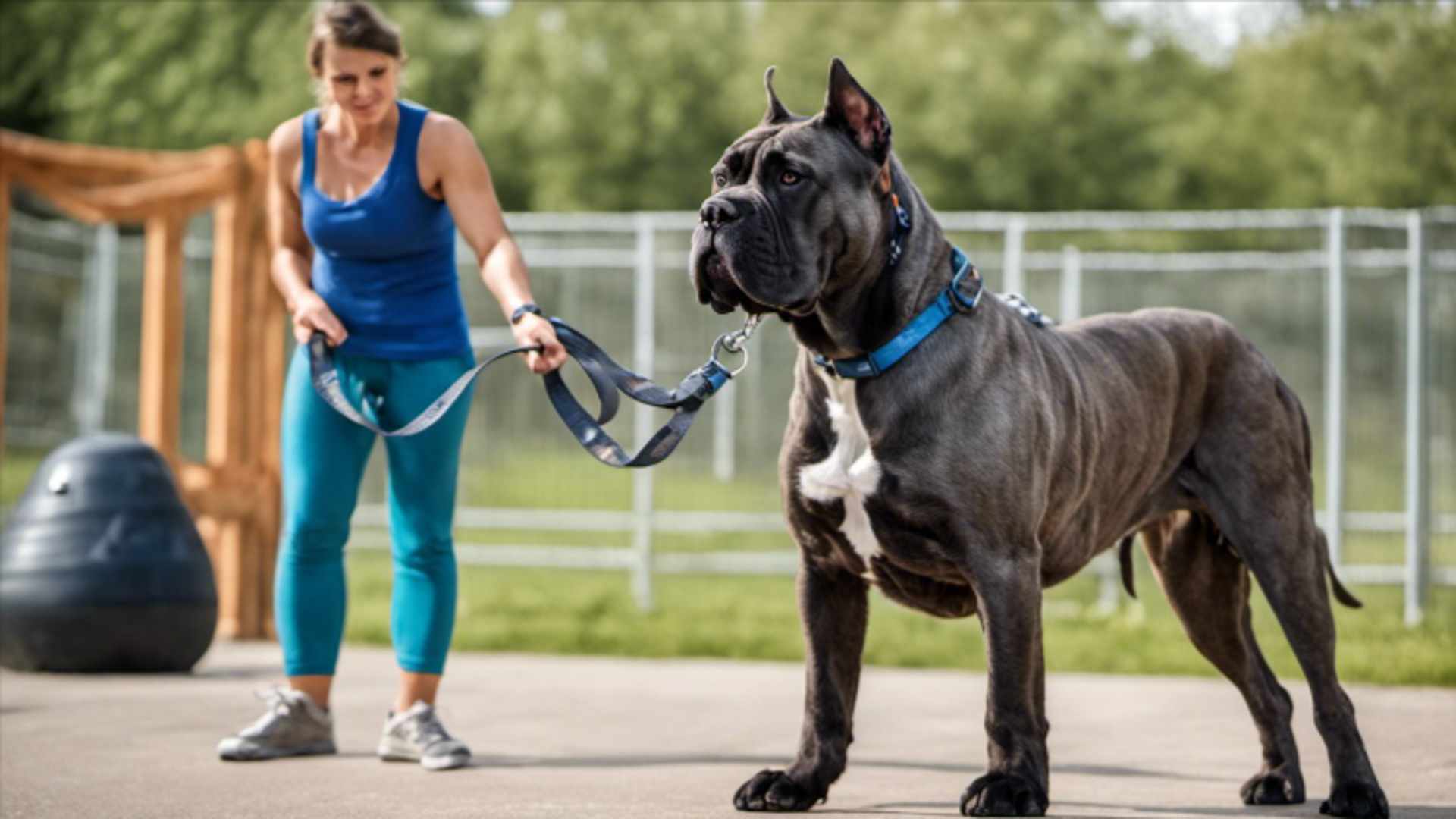Cane Corsos are a powerful and captivating breed, known for their intelligence, loyalty, and protective instincts.
As dog lovers, it’s natural for us to be concerned about the legalities surrounding the ownership of such dogs. As a result, it’s crucial to dive into the details of where Cane Corsos are legal and where they are banned.
So, without further ado, let’s start off.
Where are cane corsos banned?
In the United States, there are several places where Cane Corsos are banned due to their reputation as potentially dangerous dogs. These locations include states like Michigan and cities like Denver, where breed-specific legislation restricts or prohibits the ownership of certain breeds, including the Cane Corso.
Other countries, such as New Zealand and Norway, also have restrictions on owning Cane Corsos. If you are considering getting a Cane Corso as a pet, it is important to research the laws and regulations in your area to ensure compliance with any restrictions on ownership.
One common question that arises among potential owners is “Where are Cane Corsos banned?” It’s essential to be informed about these restrictions before bringing a Cane Corso into your home.
Let’s see more in detail which countries ban cane corso.
United States
In the United States, the legal status of the Cane Corso varies across different states. Some states have breed-specific legislation (BSL) in place, targeting specific breeds such as the Cane Corso, Rottweiler, and Pit Bull types.
For example, in Kansas and Washington, specific counties have implemented restrictions on the ownership of these breeds. In contrast, states like Colorado have banned BSL at the state level, allowing the ownership of Cane Corsos without restrictions.
Canada
In Canada, each province has its own regulations regarding dog breeds. While Ontario has a province-wide ban on Pit Bull and Pit Bull types, the Cane Corso is not currently listed under this ban.
However, some cities or municipalities within Canada may have restrictions on the ownership of Cane Corsos. It’s essential to check the local laws before bringing a Cane Corso into a specific area.
In fact, depending on the law, there may be some restrictions that apply to the breed even in areas where they are not banned.
Some restrictions may include the following:
- You may need to purchase liability insurance with a predetermined coverage amount.
- It may be required to display ‘vicious dog’ signs outside of the dog’s residence.
- The dog may need to wear a ‘vicious dog’ tag or other identifying marker.
- Muzzle on the dog while in public.
Of course, these restrictions can depend on the area, so be sure to check your local laws.
Australia
Australian laws about dog breeds are complex, with each state and territory having its own regulations. Currently, the Cane Corso is not a restricted or prohibited breed in any state or territory.
However, it’s classified as a ‘strong breed’ in certain regions, which means owners may face stricter regulations on keeping and handling these dogs. Always consult local laws before owning a Cane Corso in Australia.
Are cane corso banned in the UK?
While the Cane Corso breed is not banned in the UK, specific regulations may apply. Local authorities may enforce restrictions on certain breeds or require them to be muzzled in public spaces.
However, checking with local councils or authorities for updated information on owning Cane Corsos in the UK is advisable.
Why are cane corso banned?
The Cane Corso breed is banned in certain locations due to concerns about their temperament and potential for aggression. In some areas, they are seen as a dangerous breed that can pose a threat to public safety.
Issues such as improper breeding, lack of socialization, and irresponsible ownership can exacerbate these fears.
The breed-specific legislation that prohibits Cane Corsos in certain countries and states raises questions about why they are banned and whether this approach is effective in preventing dog-related incidents.
Breed-specific legislation
Breed-specific legislation (BSL) refers to laws that regulate or ban certain dog breeds in an attempt to decrease dog attacks on humans and other animals. These laws are also known as breed-discriminatory laws or pit bull bans.
Experts agree that BSL and similar policies that restrict dogs based on appearance do not reduce dog bites in communities or enhance public safety.
Dangerous dog laws
Depending on the country you reside in, BSL can vary significantly . Some countries have implemented dangerous dog laws, which are legal regulations that target any breed of dog determined to be a risk to public safety.
This is particularly true when it comes to the Cane Corso, a large and powerful breed that can be mistaken for others, such as the Pit Bull Terrier or Bull Terrier.
Identifying a dangerous breed
When we talk about ‘dangerous breeds,’ it’s important to note that aggression isn’t exclusive to certain breeds. However, some canines have a more muscular build and powerful jaw, making them capable of inflicting serious damage.
This is why breeds like the Cane Corso, Pit Bull Terrier, and Bull Terrier are sometimes labeled as aggressive or dangerous.
I can tell you; it’s essential for national and local governments to identify which breeds pose potential risks to public safety, and implement appropriate measures. In several U.S. states, for instance, BSL has been established to address these concerns.
Check out the below table for some BSL examples in the U.S.
| States with BSL | Impacted Breeds |
|---|---|
| Maryland | Pit Bulls |
| Miami-Dade County, Florida | Pit Bulls |
| Aurora, Colorado | Pit Bulls, Cane Corso, Bull Terrier |
Cane Corso regulations by country
Different countries have different rules, and this is true when it comes to owning a Cane Corso. You can find the ultimate list of restrictions and bans for this breed by country below.
1. Australia
In Australia, Cane Corso regulations vary by state. Some states require permits or have specific regulations for keeping this dog breed.
That said, the reason for not imposing a ban on keeping this breed is that there a very few of them in the whole country due to the import restrictions that have been imposed.
2. United States of America
The United States of America is a vast and diverse country, and the regulations surrounding Cane Corsos vary from state to state.
While this breed is not restricted or prohibited in any state, it’s important to note that certain cities and counties may have their own ordinances. As a responsible dog owner, it’s crucial to research and understands the laws in your local area before bringing home a Cane Corso.
3. Canada
In Canada, the regulations surrounding Cane Corsos are not consistent across all provinces. While some regions have general dog bylaws that apply to this breed, others may require specific restrictions such as muzzles and leashes.
It’s essential to be aware of the laws in your province to ensure that you are providing the best possible care for your Cane Corso.
4. Germany
Germany is a country known for its strict regulations, and the Cane Corso is no exception. As a ‘listed’ breed, owners must comply with certain requirements, including proper training and socialization and obtaining a special permit.
Also, breed-specific regulations such as muzzling and leashing in public spaces may apply. It’s important to understand and follow these regulations to ensure the safety and well-being of your Cane Corso.
5. United Kingdom
The United Kingdom has specific legislation in place for certain dog breeds, including the Cane Corso.
While this breed is not banned, owners must comply with breed-specific regulations such as muzzling and leashing in public. It’s crucial for breeders and owners to understand and follow these regulations to prevent potential legal consequences.
6. France
France is a country known for its love of dogs, but the Cane Corso is subject to specific regulations as a Category 2 breed.
Owners must obtain a permit and ensure their dog is properly trained and socialized. Muzzling and leashing requirements may vary depending on municipal regulations, so it’s crucial to research and understand the laws in your area.
7. New Zealand
New Zealand does not have specific regulations for the Cane Corso, but this breed falls under general dog regulations. As a responsible dog owner, it’s essential to be aware of local requirements and leash/muzzle laws to ensure compliance and promote public safety.
8. Singapore
Singapore is a country with strict regulations for keeping Cane Corsos. Owners must obtain a special permit and comply with regulations that include leashing, muzzling, and microchipping their dogs.
This breed is not allowed in public housing, and owners must have adequate living space for their Cane Corso.
Cane Corso bans misconceptions
When we talk about the restrictions and bans on Cane Corsos, some common misconceptions tend to surface. I want to address them and provide a clearer understanding of the situation.
First, let’s discuss the appearance of the Cane Corso. Many people mistake them for Pitbulls or other aggressive breeds due to their muscular build and imposing presence.
Note: This confusion can lead to unjustified bans or restrictions on Cane Corsos. In reality, the Cane Corso is a distinct breed with its own unique characteristics.
They were originally bred as working dogs in Italy, specifically for guarding property and livestock.
Secondly, there is the misconception that Cane Corsos are inherently dangerous and prone to attacking humans.
While it is true that some individual dogs might exhibit aggressive behavior, this is not necessarily a breed-specific trait. It’s important to understand that a dog’s disposition is influenced by various factors, such as their upbringing, socialization, and training.
Responsible ownership plays a vital role in ensuring that a Cane Corso exhibits appropriate behavior towards humans and other animals.
Another misconception pertains to the supposed aggressive behavior of Cane Corsos. While it’s true that they can be protective, this doesn’t necessarily equate to being aggressive.
A well-trained and socialized Cane Corso can be an effective guard dog while maintaining a calm and balanced temperament in everyday life. Early socialization and consistent training are important to mold a Cane Corso into a well-behaved companion.
Addressing these misconceptions is crucial in understanding the reasons behind the bans and restrictions on Cane Corsos.
By being informed and spreading accurate information, it can contribute to a more balanced and fair assessment of the breed’s suitability in various countries and states.
Cane Corso training and socialization
As a Cane Corso owner, I have learned that training and socialization are crucial for a well-behaved and happy pet. These dogs are known for their strength and protective nature, which can come off as aggressive if not properly handled.
I started socializing my Cane Corso from an early age to expose them to various situations, people, and other pets.
This helped in reducing any potential aggression and allowed them to become more comfortable in different environments. Socialization is an ongoing process, but it makes a huge difference in their overall temperament and behavior.
Training is another important factor in owning a Cane Corso. I practiced consistent and positive reinforcement training methods to teach them essential commands and manners.
Cane Corsos, like Rottweilers, are known for their intelligence and ability to learn quickly, so their training is often a rewarding experience for both the owner and the dog.
A regular exercise routine has also been instrumental in keeping my Cane Corso in top shape and managing their energy levels.
I made sure to provide a mix of physical and mental stimulation, as these dogs thrive on challenges and enjoy having a ‘job’ to do, whether it be protecting my home or engaging in advanced obedience training.
Although the appearance of Cane Corsos may seem intimidating, I’ve found that proper training and socialization can turn them into loving and loyal pets.
Despite their reputation as potentially dangerous dogs, this breed’s potential to become exceptional companions is all the more reason for owners to prioritize responsible ownership and ensure they are housed in appropriate kennel environments.
Regulating and overcoming ban efforts
I have found that some countries and states consider cane corsos to be a dangerous breed due to their protective nature and size.
As a result, they have been banned or regulated in certain locations. In the United States, local laws vary from state to state, and sometimes even from city to city.
To overcome ban efforts, responsible ownership is essential. Socialization plays a significant role in preventing potential aggression issues for cane corsos. Early socialization with other animals and people can help them become well-adjusted, approachable dogs.
When it comes to legality, some areas require cane corsos to be microchipped, neutered, and muzzled while in public. Microchipping helps authorities identify the dog’s owner and can be beneficial in the event of a lost or stolen pet.
Neutering can lower aggression levels, and it’s recommended for all owners regardless of the breed’s legal status.
Third-party liability insurance can be mandatory for cane corso owners in certain locations. This insurance provides financial protection for the owner if their dog causes property damage or injures someone.
Furthermore, putting up signs to inform others of the presence of a cane corso can also prove useful in mitigating potential risks.
Summary
Before we move on to the conclusion, we’ve summarized this article into a short list of key points for you to remember:
- Cane Corsos are a powerful breed known for their intelligence, loyalty, and protective instincts.
- Third-party liability insurance can be mandatory for Cane Corso owners in certain locations, and neutering is recommended for all owners regardless of the breed’s legal status.
- Breed-specific legislation (BSL) refers to laws that regulate or ban certain dog breeds to decrease dog attacks on humans and other animals.
- In Europe, countries have individual laws regarding the legality and ban of certain dog breeds, including the Cane Corso.
- In the United States, some states have breed-specific legislation (BSL) targeting specific breeds such as the Cane Corso, Rottweiler, and Pit Bull types, while other states have banned BSL at the state level.
Final thoughts
My experience with Cane Corso ownership has been both challenging and rewarding! With proper training, socialization, and exercise, these dogs truly make excellent protectors and companions for those who are prepared to invest the time and dedication required for their care.
Want to learn more about Cane Corso?
Ready to boost your knowledge to the next level? If so, check out the articles below:
- Do Shock Collars Work on Cane Corso? (Let’s Find Out)
- What Were Cane Corsos Bred For? Complete Guide ([year])
- How Do Cane Corsos Handle Weather Temperatures? (Complete Guide)





